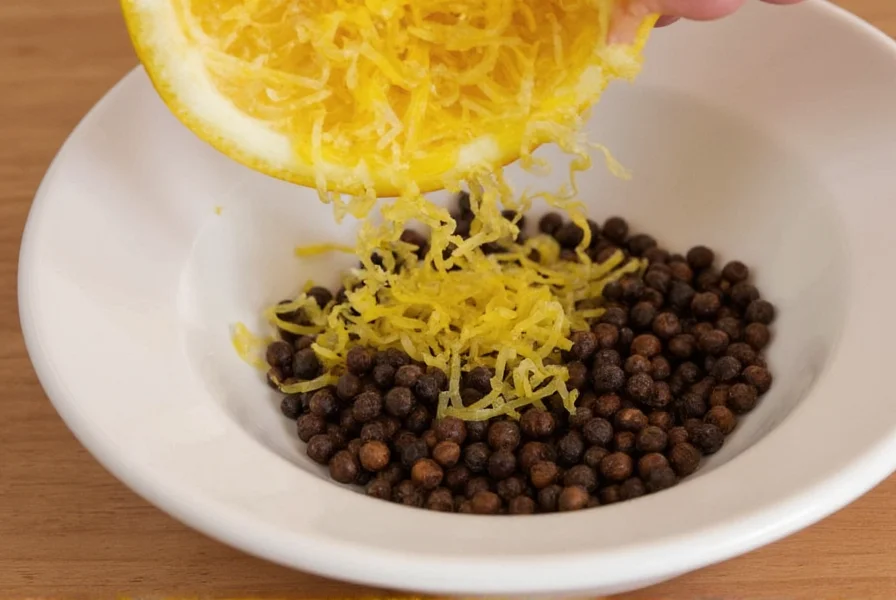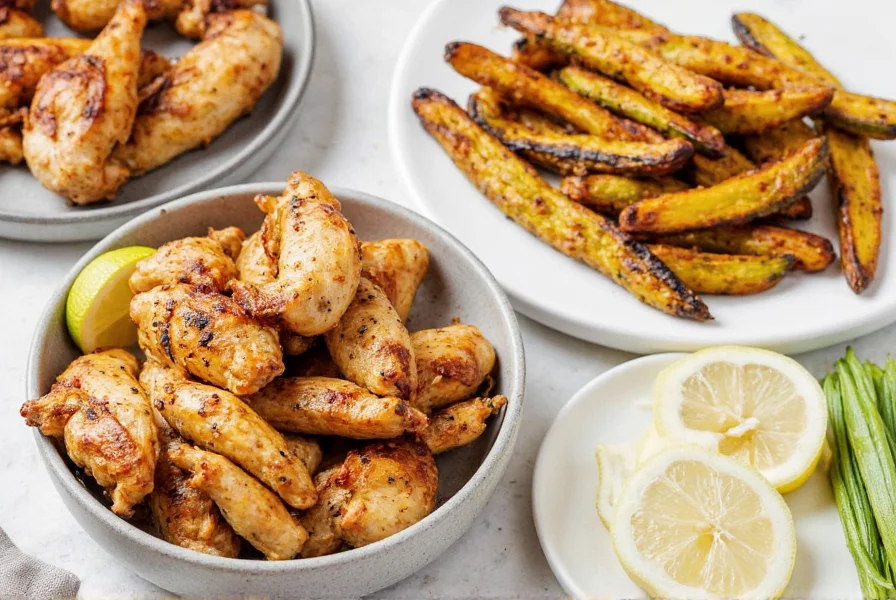The best homemade lemon pepper recipe combines fresh lemon zest, cracked black pepper, garlic powder, and optional salt. This simple 5-ingredient seasoning takes just 10 minutes to make, yields approximately 1 cup, and stays fresh for up to 6 months when stored properly. Unlike store-bought versions, this recipe lets you control ingredient quality and customize flavors to your preference.
Creating your own lemon pepper seasoning unlocks superior flavor and freshness compared to commercial blends. Store-bought versions often contain anti-caking agents, fillers, and inconsistent pepper quality that diminish the bright citrus and bold pepper notes you deserve. When you make homemade lemon pepper seasoning from scratch, you control every element - from the coarseness of your pepper to the intensity of lemon flavor.
Why This Lemon Pepper Recipe Works
This carefully balanced formula delivers restaurant-quality results through three key principles:
- Fresh citrus oils - Using actual lemon zest rather than dried lemon peel provides vibrant, aromatic flavor that dried alternatives can't match
- Proper pepper ratio - A 3:1 pepper-to-lemon ratio creates balanced heat without overwhelming the citrus notes
- Optimal drying technique - Air-drying the mixture preserves volatile flavor compounds better than oven methods
Simple Lemon Pepper Seasoning Ingredients
This salt-free lemon pepper recipe uses just five pantry staples. Measurements are designed for consistent results every time:
| Ingredient | Amount | Why It Matters |
|---|---|---|
| Fresh lemon zest | 3 tablespoons | Provides bright citrus oils (avoid white pith) |
| Coarsely cracked black pepper | 9 tablespoons | Freshly cracked delivers superior flavor to pre-ground |
| Garlic powder | 1½ teaspoons | Adds savory depth without burning like fresh garlic |
| Onion powder | 1 teaspoon | Enhances umami notes subtly |
| Sea salt (optional) | 1½ teaspoons | Omit for salt-free version; enhances flavor perception |

Step-by-Step Preparation Guide
Follow these precise steps for the best lemon pepper recipe for chicken and other proteins:
- Zest the lemons using a microplane grater, avoiding the bitter white pith. You'll need 3 tablespoons of fine zest.
- Crack the pepper using a mortar and pestle or spice grinder set to coarse setting. Pre-ground pepper loses essential oils too quickly.
- Combine ingredients in a glass bowl - lemon zest, cracked pepper, garlic powder, onion powder, and salt (if using).
- Air-dry the mixture by spreading on parchment paper for 2-3 hours at room temperature. This crucial step prevents clumping and preserves flavor.
- Store properly in an airtight glass container away from light and heat sources.
Customizing Your Lemon Pepper Blend
Once you've mastered the simple lemon pepper seasoning ingredients, try these professional variations:
- Keto-friendly version: Add ½ teaspoon dried dill and ¼ teaspoon celery seed for enhanced herbal notes without carbs
- Extra citrus variation: Incorporate 1 teaspoon orange zest along with lemon for complex citrus profile
- Spicy kick option: Mix in ¼ teaspoon cayenne pepper for subtle heat that complements rather than overwhelms
- Herb-infused blend: Add 1 teaspoon dried thyme or rosemary for Mediterranean flair
How to Use Lemon Pepper Seasoning
This versatile blend shines across multiple cooking applications:
- Proteins: Rub generously on chicken breasts before pan-searing, or mix with olive oil for salmon marinade (use 1 tablespoon per pound of protein)
- Vegetables: Toss roasted asparagus or potatoes with 1-2 teaspoons for bright flavor enhancement
- Grains: Stir into cooked quinoa or rice for instant flavor upgrade
- Sauces: Whisk 2 teaspoons into mayonnaise for quick dipping sauce
Storage Guidelines for Maximum Freshness
Proper storage determines how long your homemade lemon pepper lasts. Follow these science-backed methods:
- Use amber glass containers to block light exposure that degrades citrus oils
- Store in a cool, dark cupboard (not next to the stove or oven)
- Keep away from humidity sources like the dishwasher or sink
- Use within 6 months for peak flavor (though safe indefinitely)
Never refrigerate dry spice blends - the moisture will cause clumping and flavor loss. If your mixture hardens, break it apart with a clean fork and use immediately.
Troubleshooting Common Issues
Fix these frequent problems with professional solutions:
- Problem: Lemon flavor disappears quickly
Solution: You likely included pith when zesting. Always zest only the colored portion of the peel. - Problem: Seasoning clumps together
Solution: Insufficient drying time. Extend air-drying to 4 hours in humid climates. - Problem: Pepper flavor overpowers citrus
Solution: Your pepper was too finely ground. Use coarsely cracked pepper next time.

Frequently Asked Questions
Can I use dried lemon zest instead of fresh?
While fresh zest delivers superior flavor, you can substitute 1 tablespoon dried lemon zest for 3 tablespoons fresh. However, the flavor will be less vibrant and more one-dimensional. For best results with dried zest, rehydrate it by mixing with 1 teaspoon olive oil before combining with other ingredients.
How much lemon pepper equals one store-bought container?
This recipe yields approximately 1 cup of seasoning, which equals two standard 4-ounce commercial containers. Most store-bought blends contain fillers and anti-caking agents, so our homemade version provides more actual seasoning per volume measurement.
Why does my homemade lemon pepper taste different from restaurant versions?
Restaurant versions often include MSG or additional flavor enhancers. For closer approximation, add ¼ teaspoon mushroom powder (porcini works well) to your blend. This provides natural umami that mimics professional formulations without artificial ingredients.
Can I make this recipe without a microplane grater?
Yes, but you'll need to be extra careful to avoid the bitter white pith. Use the smallest holes on a standard box grater and rotate the lemon frequently. Alternatively, carefully peel lemons with a vegetable peeler (avoiding white pith), then mince the zest extremely fine with a sharp knife before mixing with other ingredients.
Does lemon pepper seasoning need refrigeration?
No, properly dried lemon pepper should be stored at room temperature in an airtight container. Refrigeration introduces moisture that causes clumping and accelerates flavor degradation. The natural acidity of lemon and low moisture content of the dried blend make refrigeration unnecessary for food safety.











 浙公网安备
33010002000092号
浙公网安备
33010002000092号 浙B2-20120091-4
浙B2-20120091-4